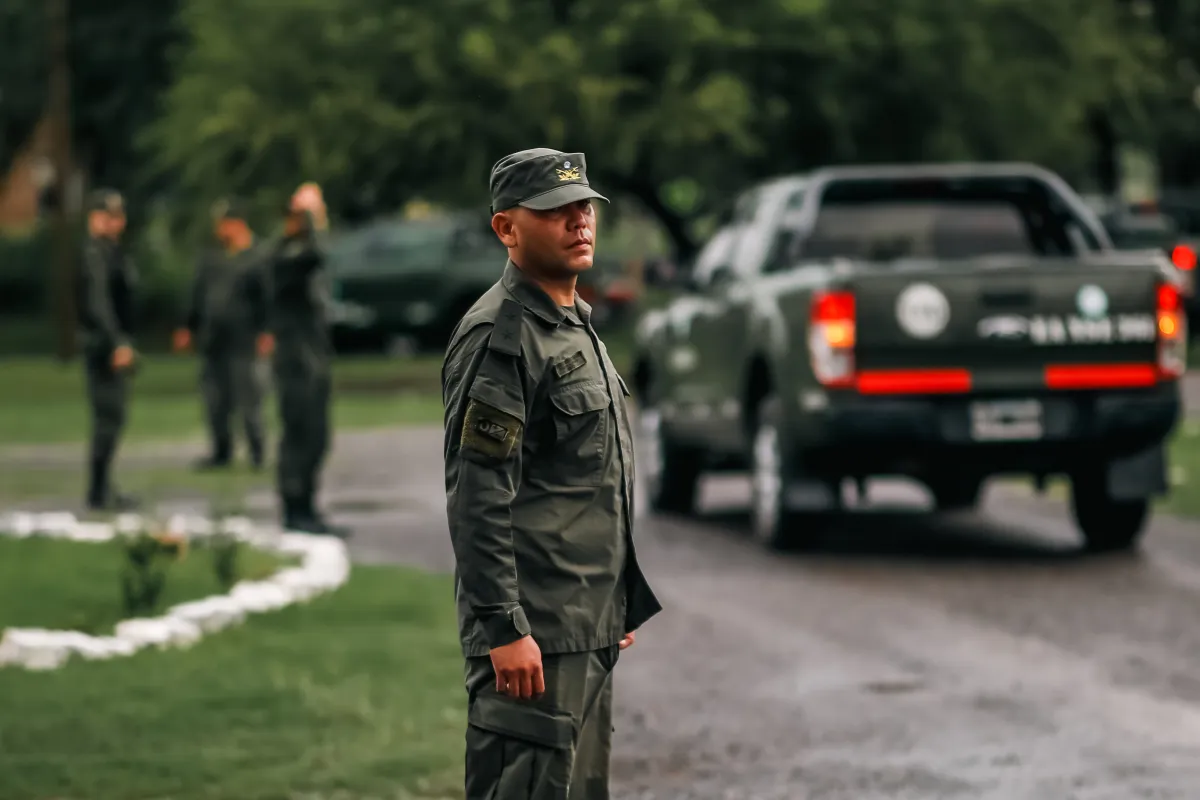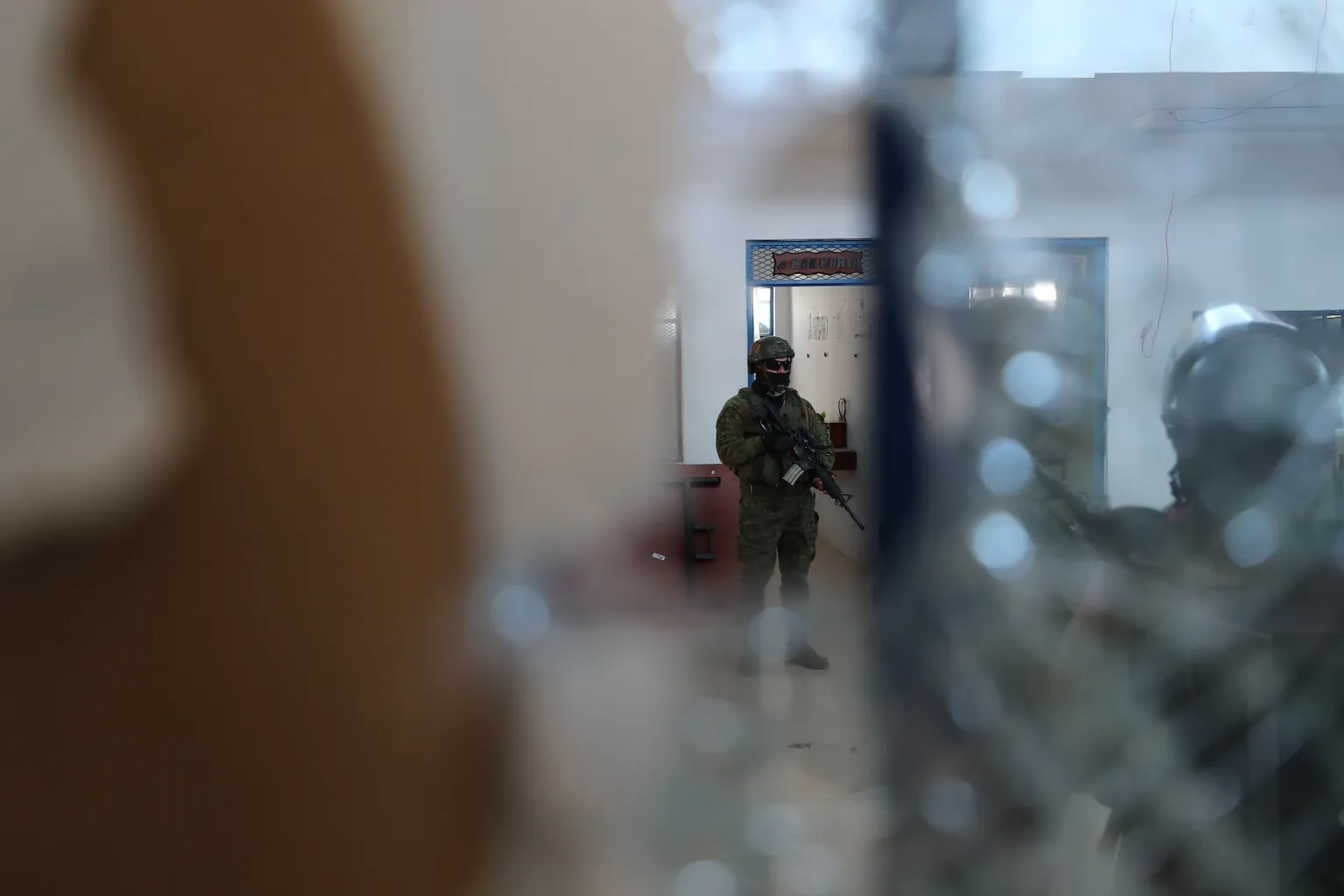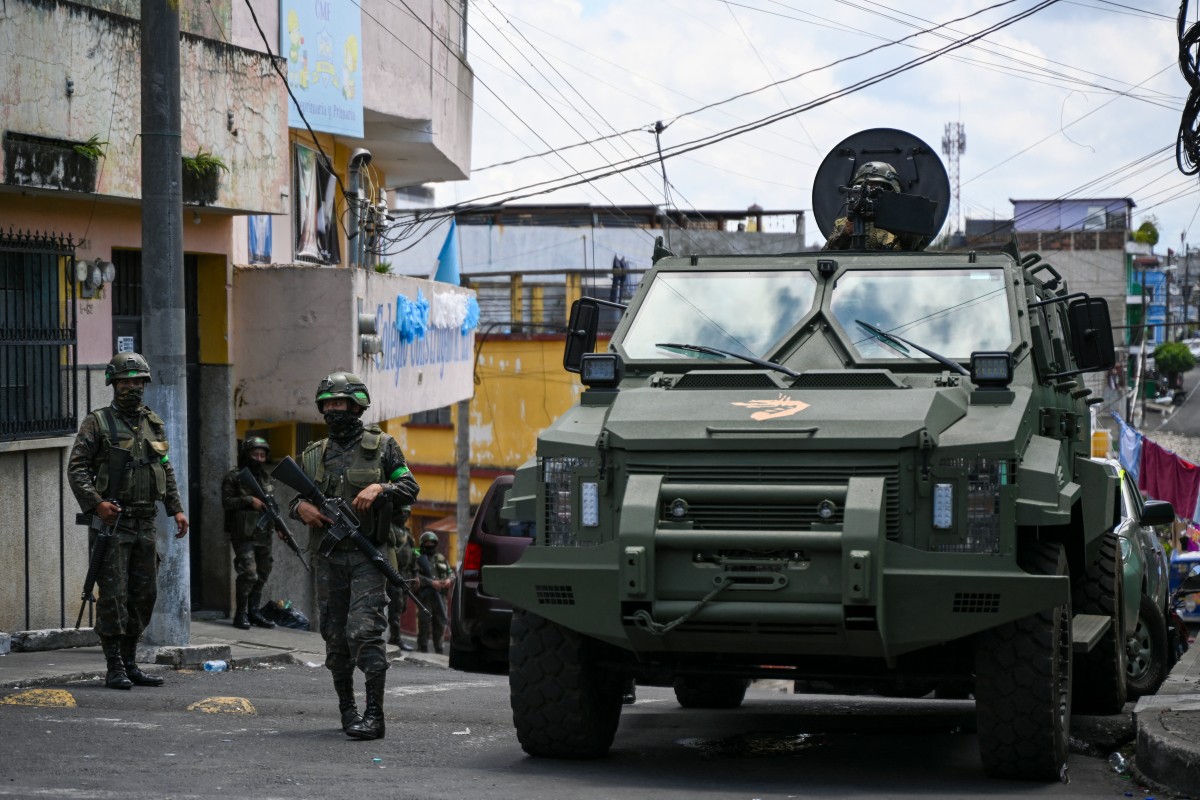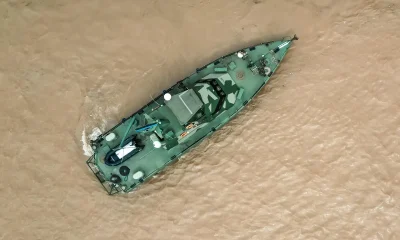Sin categoría
The Argentine Army arrives in Rosario for logistical support in the fight against drug trafficking

Troops of the Argentine Army and Navy arrived this Thursday in the city of Rosario to provide logistical support to the federal forces deployed since the beginning of the week in the operation designed by the national and provincial Executive to combat “narcoterrorism”.
Twenty-two vehicles with troops from both bodies of the Armed Forces entered that town in the province of Santa Fe (center-east) that has experienced in recent weeks a resurgence of violence associated with drug trafficking, with the death of four citizens randomly attacked by hitmen.
According to the press by the Undersecretary of Federal Intervention of the Ministry of National Security, Federico Angelini, it is “a very important logistical support for greater coverage and presence, so that the neighbors see and feel safer and that when the criminals leave their homes they see that we are there.”
Military vehicles arrived around 12:30 local time (15:30 GMT) at the Güemes detachment of the National Gendarmerie in Rosario and, according to the authorities present, this presence will soon be complemented by helicopters, trucks and drones.
These troops are the first of the Armed Forces who join the 100 gendarmes who arrived the day before and the 450 who arrived between Monday and Tuesday, all members of the federal forces deployed by the Argentine Ministry of Security for the fight against drug trafficking.
For his part, the mayor (mayor) of Rosario, Pablo Javkin, stressed that the authorities are in a “battle to win normality,” because the bands sought to “infuse terror” with their latest actions.
Javkin commented that, in addition to the murder of two taxi drivers, a bus driver and a gas station worker, there have been “threats by phone and attempts to alter school activity.”
Despite the security device, one of the citizen complaints in recent days was the low police presence in the streets, after the announcement made on Monday by the minister, Patricia Bullrich, accompanied by the head of Defense, Luis Petri, and the governor of Santa Fe, Maxi Pullaro.
Angelini justified this Thursday that “they are not going to see (in the streets) a gendarme, a prefect, a federal policeman with a helmet just for them to see it,” since he argued: “We came to Rosario to pacify her, so that the people of Rosario can be better.”
The mayor of Rosario highlighted the work of the unified crisis committee, which includes the three levels of Administration (national, provincial, local) and recalled that, in the current situation, Governor Pullaro “is installed in the city.”
However, he did not want to take stock of the situation because, he said, “this is day by day and there are many things at the same time.”
Rosario, the third most populous city in Argentina, has been living for several years punished by the violence associated with drug trafficking. In recent weeks, in retaliation for the protocol of action in prisons that imitate the ‘Bukele style’, the town has recorded several murders of citizens with no links to organized crime.
Sin categoría
Eight Killed in Series of Armed Attacks in Ecuador’s Manabí Province

At least eight people were killed in four separate armed attacks reported Sunday night in the cities of Manta and Montecristi, in Ecuador’s coastal province of Manabí, one of the areas hardest hit by the country’s escalating wave of criminal violence, local media reported on Monday.
The shootings occurred between 7:50 p.m. and 10:50 p.m. local time and affected several neighborhoods, as well as a family gathering, according to press reports. Police are investigating the incidents.
The first attack took place in the Los Artesanos sector of Montecristi, where a couple was shot dead in a public street.
Minutes later, in Manta’s 12 de Octubre neighborhood, a man was killed while sitting down. Police arrested a suspect at the scene and seized a 9mm magazine, authorities said.
A third incident occurred in the Bellavista area of Manta, when an armed assailant entered a home and shot a man during a family celebration. The attacker was captured by neighbors and sustained injuries.
The deadliest attack was reported at 10:50 p.m. in the Leonidas Proaño parish of Montecristi, where gunmen opened fire from two vehicles on a group of people, leaving four dead and five wounded.
According to Jaime Salgado, acting chief of the Manta Police District, officers recovered seven 7.62mm shell casings, consistent with rifle ammunition, and 14 .40-caliber casings at the scene.
With these killings, the Manta police district, a port and tourist area on Ecuador’s Pacific coast, has recorded 51 violent deaths so far in January 2026, according to official figures.
The attacks occurred amid a state of emergency declared by the government in December due to serious internal unrest in Manabí, where military operations have been intensified this month, particularly in high-conflict zones.
Sin categoría
El Salvador Launches Fourth Year of Ocean Mission to Protect Marine Ecosystems

El Salvador’s Ministry of Environment has launched the fourth consecutive year of “Ocean Mission,” a permanent strategy focused on the protection, restoration, and responsible management of marine ecosystems, linking conservation efforts from inland mountain ranges to the coastline.
During an event held at the Los Cóbanos Protected Natural Area, Environment Minister Fernando López highlighted the ecological, social, and economic value of the site, which is recognized as the country’s eighth wetland of international importance under the Ramsar Convention.
“We are in one of the most valuable natural treasures of our country, not only because of its beauty, but also due to the enormous ecological, social, and economic importance that Los Cóbanos holds for El Salvador,” López said.
The minister emphasized that this volcanic-origin ecosystem is home to coral reefs and key coastal-marine systems that serve as refuge, breeding, and feeding grounds for emblematic species such as sea turtles, cetaceans, and a wide diversity of fish.
“Protecting Los Cóbanos means protecting biodiversity, community livelihoods, the local economy, and our natural heritage,” López stated.
He also stressed that Ocean Mission goes beyond rhetoric, focusing instead on direct action framed within the National Environmental Education Policy. “We are not here to talk about environmental education; we are here to practice it,” he said, underscoring the guiding principle of moving from paper to action.
Sin categoría
Convicted gang member challenges Guatemala’s anti-gang law, citing Human Rights Violations

A member of a criminal gang currently facing sentencing for the crime of extortion has filed a constitutional appeal before Guatemala’s Constitutional Court against the recently approved and enacted Anti-Gang Law.
The appeal, submitted by Dylan Smaily Archila García, argues that the new legislation violates his fundamental human rights and claims there were procedural irregularities during its approval process, according to local Guatemalan media.
Archila García filed the motion just hours after the law took effect. The new legislation, passed by Guatemala’s Congress, increases penalties for crimes linked to gang activity and authorizes the construction of a mega-prison, modeled after El Salvador’s Center for the Confinement of Terrorism (CECOT).
Local outlets reported that in his petition, Archila García contends that the approval of the law did not comply with constitutional requirements and requests that the Court issue a ruling to annul the legislation, effectively halting its enforcement.
The appeal further claims that the Anti-Gang Law infringes on due process rights, as it allegedly fails to guarantee a fair criminal trial in which defendants can prove their innocence, undermining legal certainty and judicial security.
Through this legal action, the petitioner seeks to have the law suspended and ultimately struck down by the Constitutional Court, preventing it from being debated again in Congress.
-

 Central America5 days ago
Central America5 days agoGuatemala seizes over a ton of cocaine hidden in flour at Pacific port
-

 Central America4 days ago
Central America4 days agoGuatemala Police Arrest Prison Guard Caught in the Act of Extortion
-

 Central America4 days ago
Central America4 days agoHonduras swears in conservative president Asfura after disputed election
-

 International5 days ago
International5 days agoHistoric snowstorm paralyzes Toronto after 60 centimeters of snow
-

 Central America4 days ago
Central America4 days agoBukele leads public trust rankings as UCA survey highlights gains in security
-

 International3 days ago
International3 days agoFootball Fan Killed in Clashes After Colombian League Match
-

 International5 days ago
International5 days agoSpain’s irregular migrant population rises to 840,000, study finds
-

 Central America3 days ago
Central America3 days agoGuatemala President Says Starlink Terminal Found Inside Prison
-

 International4 days ago
International4 days agoDoomsday clock moves to 85 seconds before midnight amid rising global risks
-

 International4 days ago
International4 days agoWinter Storm Fern Leaves 30 Dead and Over One Million Without Power Across the U.S.
-

 International2 days ago
International2 days agoU.S. Senate Rejects Budget, Bringing Government Closer to Shutdown Amid DHS Dispute
-

 Sin categoría4 days ago
Sin categoría4 days agoEight Killed in Series of Armed Attacks in Ecuador’s Manabí Province
-

 International4 days ago
International4 days agoSpain approves plan to regularize up to 500,000 migrants in Historic Shift
-

 International5 days ago
International5 days agoRights group says nearly 6,000 killed in Iran protest crackdown
-

 International3 days ago
International3 days agoRubio Says U.S. Could Participate in Follow-Up Russia-Ukraine Talks
-

 International3 days ago
International3 days agoMissing Spanish Sailor Rescued After 11 Days Adrift in Mediterranean
-

 Sin categoría4 days ago
Sin categoría4 days agoEl Salvador Launches Fourth Year of Ocean Mission to Protect Marine Ecosystems
-

 Central America13 hours ago
Central America13 hours agoPanama Supreme Court Strikes Down Panama Ports Concession as Unconstitutional
-

 International5 days ago
International5 days agoVenezuela frees at least 80 political prisoners, NGO says
-

 International5 days ago
International5 days agoEU launches new probe into X over AI-generated fake nude images
-

 International2 days ago
International2 days agoStorm Kristin Kills Five in Portugal, Leaves Nearly 500,000 Without Power
-

 Central America13 hours ago
Central America13 hours agoU.S. and Guatemala Sign Trade Deal Granting Zero Tariffs to Most Exports
-

 International2 days ago
International2 days agoTrump Says Putin Agreed to One-Week Halt in Attacks on Ukraine Amid Extreme Cold
-

 International2 days ago
International2 days agoMan Arrested After Vehicle Crashes Into Jewish Institution in Brooklyn
-

 International5 days ago
International5 days agoSevere winter storm grips U.S., leaves multiple dead as extreme cold persists
-

 International5 days ago
International5 days agoFrance debates ban on social media for children under 15




























